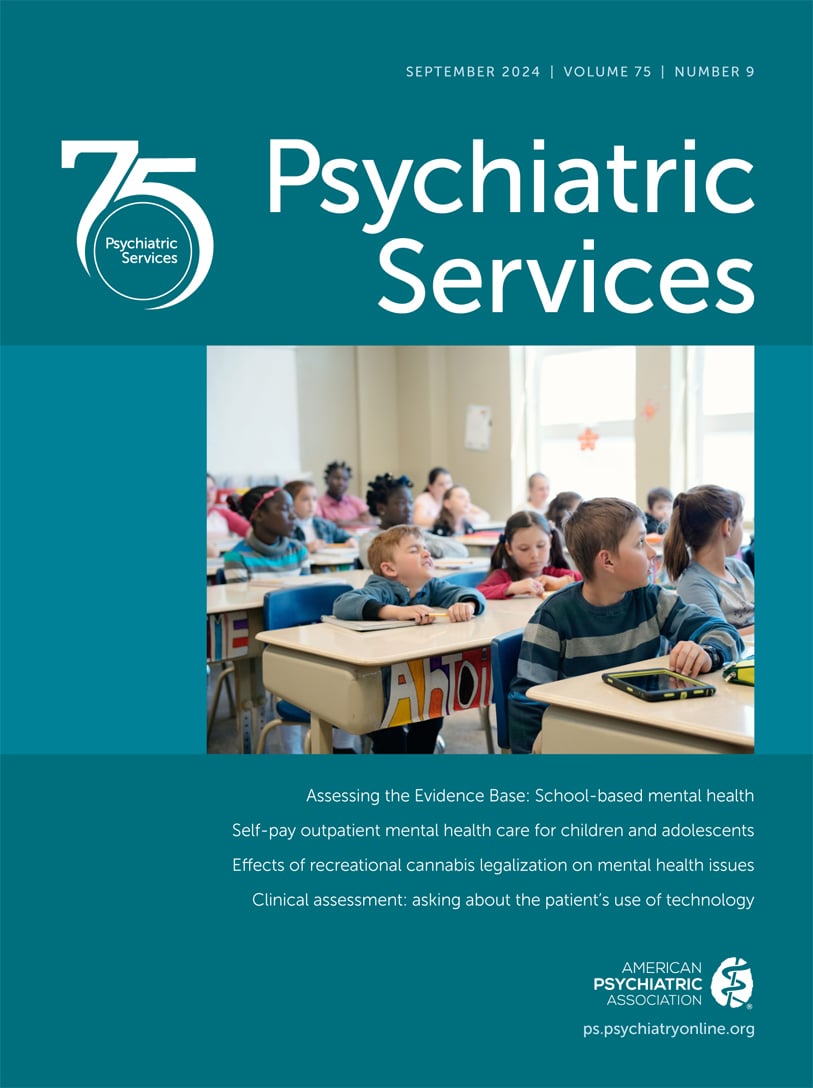Psychiatric Services
- Volume 72
- Number 5
- May 2021
Taking Issue
Articles
Publication date: 18 December 2020
Pages555–562Objective: The effectiveness of the Peer-led Group Lifestyle Balance (PGLB) intervention, a 12-month manualized healthy lifestyle intervention delivered by peer specialists, was investigated in a sample of persons with serious mental illness who were ...
https://doi.org/10.1176/appi.ps.202000304Publication date: 04 March 2021
Pages498–506Objective: This study examined associations of patient, hospital, and service system factors with provision of discharge planning to individuals treated in hospital psychiatric units. Methods: This retrospective cohort analysis used 2012–2013 New York ...
https://doi.org/10.1176/appi.ps.202000021Publication date: 11 March 2021
Pages507–513Objective: Spiritual Psychotherapy for Inpatient, Residential, and Intensive Treatment (SPIRIT) is a flexible clinical protocol for delivering spiritually integrated group psychotherapy within acute psychiatric settings. The authors evaluated SPIRIT’s ...
https://doi.org/10.1176/appi.ps.202000331Publication date: 11 March 2021
Pages514–520Objective: The authors examined whether shifts in mental health–related stigma differed across racial-ethnic groups over the course of a California statewide antistigma campaign and whether racial-ethnic disparities were present at the beginning of the ...
https://doi.org/10.1176/appi.ps.201900630Publication date: 11 March 2021
Pages521–529Objective: Veterans, especially those residing in rural areas, continue to underutilize mental health care. This longitudinal study assessed attitudes relevant to seeking mental health care services from the Veterans Health Administration (VHA) over 12 ...
https://doi.org/10.1176/appi.ps.201900275Publication date: 04 March 2021
Pages530–538Objective: This study explored the experiences of individuals with serious mental illness who were predominantly Black, were living in supportive housing, and participated in the Peer-Led Group Lifestyle Balance (PGLB) intervention. The authors examined ...
https://doi.org/10.1176/appi.ps.202000311Publication date: 11 March 2021
Pages539–545Objective: Profiles of depressive symptoms were identified among Hispanic, Black, and White parents involved in the child welfare service system, including changes in symptoms over time. Methods: Participants (N=2,109) were parents receiving SafeCare, ...
https://doi.org/10.1176/appi.ps.201900256Publication date: 26 March 2021
Pages546–554Objectives: Youths in the juvenile justice system often do not access needed behavioral health services. The behavioral health services cascade model was used to examine rates of substance use screening, identification of substance use treatment needs, ...
https://doi.org/10.1176/appi.ps.202000163Special Articles
Publication date: 11 March 2021
Pages555–562Statistical models, including those based on electronic health records, can accurately identify patients at high risk for a suicide attempt or death, leading to implementation of risk prediction models for population-based suicide prevention in health ...
https://doi.org/10.1176/appi.ps.202000214Global Mental Health Implementat Ion Science Protocol
Publication date: 09 December 2020
Pages563–570Background: This article describes the incorporation of an evidence-based mental health intervention, the Youth Readiness Intervention (YRI), into a youth entrepreneurship training program in Sierra Leone. A collaborative team approach (CTA) was used as ...
https://doi.org/10.1176/appi.ps.202000009Publication date: 12 January 2021
Pages571–577Background: The health system in Ghana is severely underequipped to meet the needs of children with behavioral health problems. A substantial treatment gap exists among individuals with behavioral challenges, necessitating the implementation of an ...
https://doi.org/10.1176/appi.ps.201900626Brief Reports
Publication date: 03 November 2020
Pages578–581Objective: The goal of this study was to examine the impact of substance use disorder on the risk of hospitalization, complications, and mortality among adult patients diagnosed as having COVID-19. Methods: The authors conducted a propensity score (PS)–...
https://doi.org/10.1176/appi.ps.202000534Publication date: 11 March 2021
Pages582–585Objective: In this study, the authors aimed to characterize psychoeducation provided to inpatients with first-episode psychosis (FEP) and their families. Methods: Psychiatrists were surveyed about how they provide psychoeducation to this population. ...
https://doi.org/10.1176/appi.ps.201900633Publication date: 18 March 2021
Pages586–589Objective: Collaborative chronic care models (CCMs) were established with implementation support in nine mental health clinics. This study sought to determine whether their clinical impact was maintained after implementation support ceased. Methods: ...
https://doi.org/10.1176/appi.ps.202000117Perspectives & Columns
Open Forum
Publication date: 11 March 2021
Pages591–593In recent years, investment in participatory research methods within mental health services research has grown. Participatory efforts are often limited in scope, however, and attention to research leadership is largely absent from discourse about ...
https://doi.org/10.1176/appi.ps.202000468Publication date: 09 February 2021
Pages594–596During the COVID-19 pandemic, frontline workers have faced unparalleled levels of distress, and hospitals have used many interventions to improve workers’ mental health. However, service workers—including water, sanitation, and hygiene staff; food service ...
https://doi.org/10.1176/appi.ps.202000569Perspectives & Columns
Datapoints
Perspectives & Columns
Social Determinants of Mental Health
Publication date: 17 February 2021
Pages598–601Contracting COVID-19, being exposed to it, or being affected by societal containment measures can have consequences that are themselves social determinants of health. Preexisting social determinants of health also drive the disproportionately high ...
https://doi.org/10.1176/appi.ps.202000393Perspectives & Columns
State Mental Health Policy
Publication date: 18 December 2020
Pages602–605The COVID-19 pandemic has disrupted public mental health systems across the country, nowhere more than in New York State (NYS). The authors describe the NYS public health agency’s response to the pandemic and offer ideas for redesigning public mental ...
https://doi.org/10.1176/appi.ps.202000400Perspectives & Columns
Research, Community, & Services Partnerships
Publication date: 04 March 2021
Pages606–609As peer-delivered services are increasingly embedded within behavioral health organizations, a need has arisen to identify practices that facilitate supervision and support of peer providers. The authors present supervision strategies and lessons learned ...
https://doi.org/10.1176/appi.ps.202000515Perspectives & Columns
Promoting High-Value Mental Health Care
Publication date: 20 January 2021
Pages610–613Mental health stability among patients with cancer improves adherence to oncology treatment, contributing to better outcomes. In a comprehensive cancer center, the no-show rate for the psychiatric oncology clinic was higher than that of any other clinic ...
https://doi.org/10.1176/appi.ps.201900480Editor’s Choice
Letters
Past Issues
View Issues Archive
Vol. 75 | No. 12

Vol. 75 | No. 11

Vol. 75 | No. 10
